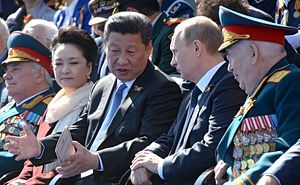Chinese Foreign Minister Wang Yi met with his Russian counterpart, Foreign Minister Sergey Lavrov, on Wednesday, on the sidelines of the ASEAN Foreign Minister’s Meeting in Kuala Lumpur. According to Xinhua, Wang told Lavrov that “China is willing to strengthen the strategic coordination with Russia on Asia-Pacific affairs to promote a common, cooperative, comprehensive and sustainable Asian security concept and jointly safeguard regional peace, stability and development.” It’s the latest indication that China is seeking to leverage Russia’s growing military presence in the region to advance its own security and defense interests in the Pacific.
China and Russia already have a history of cooperation in Central Asia, defying predictions that competition over that region will derail their relationship. The two countries function as co-leaders in the Shanghai Cooperation Organization, and have even linked together their economic visions for the region (Russia’s Eurasian Economic Union and China’s Silk Road Economic Belt). When it comes to the Pacific Ocean region, however, Russia and China’s joint activities have been slower to develop – but that’s starting to change.
In part, that’s due to an increased Russia presence in the Pacific, particularly on the military front. In April, U.S. Admiral Samuel Locklear, then the commander of Pacific Command, told the House Armed Services Committee that Russia “has returned to … nearly a Cold War level of activity” in the Pacific. Russia is improving is strategic nuclear deterrent and submarine force on its eastern coast, in the north Pacific, Locklear said, and is “exerting increased influence not only in the Arctic… but also in Northeast Asia.” Russia has also been increasing its military presence in Southeast Asia, Locklear added.
Japan has also noted increased Russian military activity. In fiscal year 2014, Japan scrambled fighter jets 943 times, a 16 percent increase over FY2013 and the second-highest rate ever. That increase back to Cold War levels was partly due to increased flights by Chinese fighters near the disputed Senkaku/Diaoyu Islands in the East China Sea, but equally due to Russian bombers and patrol planes passing close to Japan’s north. In fact, Chinese aircraft accounted for under half (464) of the scrambles, Japan’s Defense Ministry reported. Scrambles to meet Russian aircraft were up roughly four times from 2004 levels.
Russia also recently announced that it will build up its military and civilian infrastructure on the Kuril Islands, which Japan claims at the Northern Territories, meaning Japan can expect Russia’s military presence in the north Pacific to continue to grow.
China, meanwhile, seems to welcome this increased Russian presence. In addition to stepping up joint military exercises, including a planned naval drill to be held in the Sea of Japan later in August, China and Russia held their first-ever meeting specifically dedicated to the topic of Northeast Asian security issues in April. At the meeting, the two countries “agreed to enhance dialogues and coordination to promote peace and stability in the region,” according to Xinhua.
For China, a more active Russian approach toward the Asia-Pacific provides a useful counterweight to U.S. influence in the region. Beijing also appreciates Moscow’s support on security issues, where the two countries often see eye-to-eye. Russia and China joined voices to object to the deployment of the U.S. missile defense system THAAD on South Korea, for example.
Still, despite Wang and Lavrov’s remarks about cooperation, China is unlikely to win rhetorical backing from Russia on the issue that will draw the most attention at this year’s ASEAN meetings: the South China Sea disputes. China has come under heavy criticism from Southeast Asian countries, Japan, and the United States for its land reclamation activities. Russia, meanwhile, has refrained from defending China – and has even sold six Kilo-class submarines to Vietnam, one of the rival claimants.
It’s precisely this close relationship with Vietnam that has prevented Moscow from giving moral support to Beijing on the disputes. As Anton Tsvetov, media and government relations manager at the Russian International Affairs Council, put it in a recent article for Russia Direct, “Russia’s possible involvement in the South China Sea dispute would have been a no-brainer if another vocal claimant –Vietnam — weren’t also the country’s closest partner in Southeast Asia.” In its attempt to avoid antagonizing either China or Vietnam, Russia has adopted what Tsvetov describes as an almost “non-existent” position on the disputes. As a sign of Russia’s tightrope walk, there are plans for Russia to hold joint naval exercises in the South China Sea next year. with its “Asia-Pacific allies,” which would likely include not only China but Vietnam as well.
While China would appreciate diplomatic cover from Russia on the South China Sea issue, such support is not forthcoming. Still, Beijing hopes to work with Moscow more productively on Northeast Asian issues. Russia’s support will be crucial as China tries to advance its own security vision for the Asia-Pacific region — a vision where the United States plays a much diminished role.

































